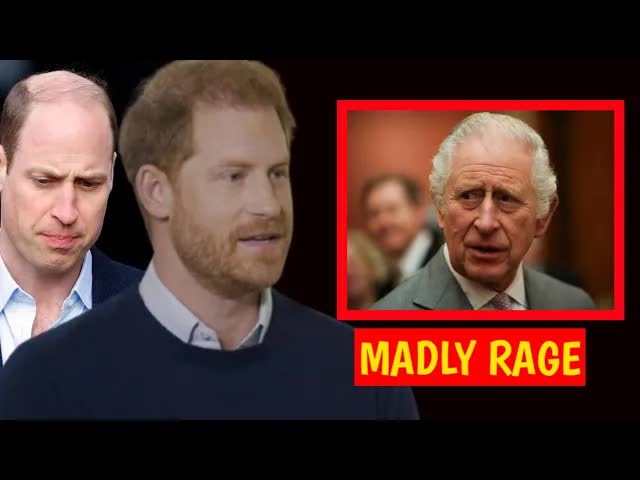Must Read
Royal Turmoil: Prince Harry Feels the Heat as King Charles Elevates Prince William
The British royal family has always been a hotbed of intrigue and drama, but recent developments have stirred the pot even more.
Prince Harry, often seen as the rebellious redhead of the family, is grappling with feelings of exclusion as his father, King Charles III, accelerates plans to empower Prince William.
This move raises eyebrows and questions—are we witnessing the dawn of a new era or merely another chapter in the royal saga of sibling rivalry?
The monarchy is steeped in tradition, with the crown typically passed down through generations.
However, King Charles III appears eager to shake things up.
His intention to bestow greater authority upon Prince William, the heir apparent, has sent ripples of discontent, particularly for Harry, who has distanced himself from royal duties since 2020.
Having relocated to California with Meghan Markle, he now finds himself on the sidelines during a pivotal moment in royal history.
Harry's response to this shift is a complex blend of sadness and frustration.
He has openly discussed feeling overshadowed by the royal institution and now, with his brother poised for a more prominent role, those feelings are intensifying.
Is Harry's reaction merely a product of sibling rivalry, or does it reflect deeper sentiments about his place within the family?
The monarchy is evolving at an unprecedented pace, driven largely by King Charles's desire to modernize its image.
By empowering William and Kate, who resonate with younger audiences, Charles aims to create a leaner, more relatable royal family.
This strategy is not without its challenges, however.
As Charles, now 75, seeks to enjoy his reign with less burden, tensions within the family are palpable.
The dynamics between Prince William and Prince Harry have shifted dramatically over the years.
Once inseparable as children, their paths have diverged due to royal obligations.
William's role as the future king comes with expectations, while Harry, the spare, often grapples with a lack of clear purpose.
This disparity breeds misunderstandings and resentment, especially as William ascends to greater responsibilities.
Public opinion is sharply divided in this royal drama, with supporters rallying around both princes.
Team William champions him as the rightful leader, praising his dedication and approachability.
Conversely, Team Harry sympathizes with his struggles, advocating for recognition of his unique contributions.
Social media is buzzing with debates, memes, and passionate opinions, but beneath the surface lies a pressing question: how can the monarchy navigate these familial rifts while maintaining its relevance?
As for Harry, his future remains uncertain.
Known for his unpredictability—whether through military service, mental health advocacy, or his candid memoir, Spare—he stands at a crossroads.
Possible outcomes include reconciliation with his family, further distancing himself from royal life, or perhaps carving out a distinctive role that allows him to contribute on his own terms.
Whatever path he chooses, one thing is clear: his journey continues to captivate audiences worldwide.
This royal rift offers lessons that extend beyond the palace walls.
It reflects universal themes of family dynamics, including sibling rivalries, parental expectations, and the quest for individuality.
The importance of open communication emerges as a key takeaway, reminding us all that honest dialogue is vital in any relationship.
Furthermore, as roles evolve, embracing change is essential for growth, whether in a royal family or a workplace.
To navigate these choppy waters, the British royal family must prioritize unity and transparency.
Encouraging private discussions among family members could help resolve misunderstandings, while clearly defining each royal's role may minimize confusion and resentment.
Engaging the public with transparency about significant decisions will foster trust and understanding.
As King Charles III accelerates his plans to transition power to Prince William, the monarchy stands at a pivotal juncture.
This moment signifies the end of one era and the potential beginning of another—one that could either solidify the royal family's relevance or deepen its divisions.
For Prince Harry, this chapter is bittersweet, serving as a poignant reminder of what he has left behind while he forges ahead.
In this unfolding narrative, the historical context cannot be overlooked.
The British monarchy has weathered numerous transitions, some smooth and others fraught with tension.
From Edward VIII's shocking abdication to Queen Elizabeth II's lengthy reign, these moments reveal the intricate dance between personal and political within royal families.
As Prince William prepares to take on a larger role, he faces the challenge of modernizing the monarchy while respecting its traditions.
Supported by Kate Middleton, who is poised to become a powerful queen in her own right, William must navigate public scrutiny alongside his duties.
Their partnership symbolizes hope for a more relevant and accessible monarchy in the 21st century.
Meanwhile, Meghan Markle's influence looms large over Harry's decisions.
As she champions causes like gender equality and mental health, her presence shapes Harry's narrative.
Together, they strive to carve out a life independent of royal constraints, yet their connection to the royal family remains a vital part of their story.
The question lingers: can they reconcile with the Windsors, or has their departure created an insurmountable divide?
As the public plays an integral role in shaping the monarchy's future, the Windsors must balance tradition and modernity.
The expectations of transparency and unity weigh heavily on them, as they seek to maintain the mystique that has kept the monarchy alive for centuries.
Ultimately, the ongoing saga of the British royal family is a reflection of our own familial struggles, reminding us that even those in the spotlight grapple with the complexities of love, rivalry, and identity.




































